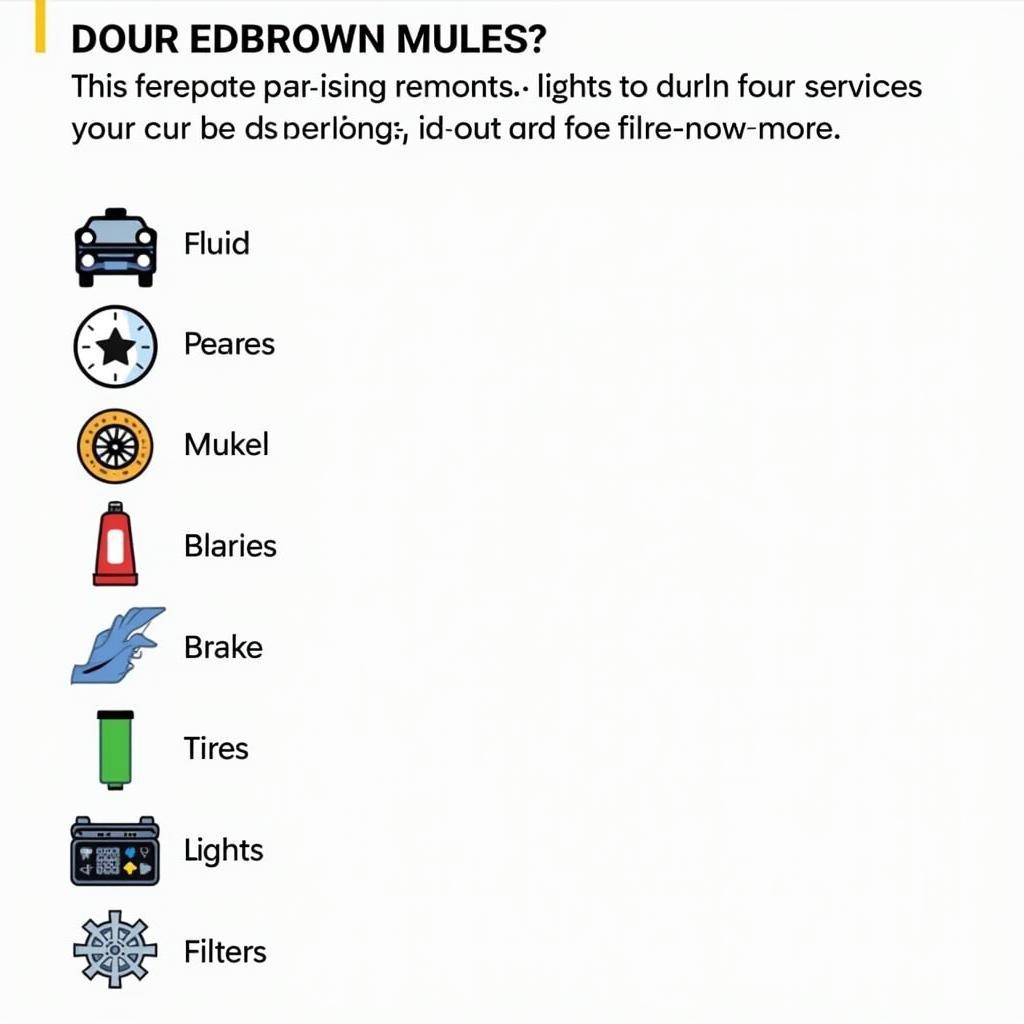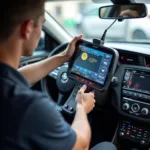Car Servicing Check Points 2019 may seem outdated, but understanding the core checks from that period provides a solid foundation for modern vehicle maintenance. This guide explores those essential checks, explaining their importance and how they contribute to a safe and reliable driving experience. We’ll cover everything from basic fluid top-ups to more complex component inspections.
Essential Car Servicing Check Points From 2019
Even though technology has advanced, the fundamental car servicing check points from 2019 remain relevant. These checks focus on crucial areas that impact vehicle performance, safety, and longevity. Regularly inspecting these points can prevent costly repairs down the line and ensure a smooth, worry-free driving experience.
Fluids and Lubricants: The Lifeblood of Your Car
One of the most fundamental car servicing check points involves inspecting and topping up vital fluids. This includes engine oil, coolant, brake fluid, power steering fluid, and transmission fluid. Low fluid levels can lead to significant damage, affecting everything from engine performance to braking efficiency.
- Engine Oil: Checks the oil level and condition. Low oil can cause excessive wear and tear on the engine.
- Coolant: Ensures the cooling system is functioning correctly to prevent overheating.
- Brake Fluid: Confirms the brake system has sufficient fluid for safe and effective braking.
- Power Steering Fluid: Checks the fluid level to maintain smooth steering operation.
- Transmission Fluid: Ensures smooth gear changes and prevents transmission damage.
Brakes: Ensuring Safe Stopping Power
Brake inspections are crucial for safety. Checks include examining brake pads, rotors, and lines for wear and tear. Effective brakes are essential for preventing accidents and ensuring your vehicle can stop reliably in emergency situations.
- Brake Pads: Measures the thickness of the brake pads and checks for uneven wear.
- Rotors: Inspects the rotors for warping or damage.
- Brake Lines: Checks for leaks or damage to the brake lines.
Tires: Maintaining Grip and Stability
Tire checks involve inspecting tire pressure, tread depth, and overall condition. Correct tire pressure ensures optimal fuel efficiency and handling. Adequate tread depth is essential for maintaining grip and preventing skidding, especially in wet or icy conditions.
- Tire Pressure: Inflates tires to the recommended pressure for optimal performance and safety.
- Tread Depth: Measures the remaining tread depth to ensure safe grip on the road.
- Tire Condition: Checks for signs of damage, such as cuts, bulges, or uneven wear.
Lights and Electrical System: Ensuring Visibility and Functionality
A comprehensive car service also includes checking all lights, including headlights, taillights, brake lights, and indicators. A functioning electrical system is crucial for everything from starting the engine to powering essential safety features.
- Headlights/Taillights: Verifies that all lights are working correctly and aimed properly.
- Brake Lights/Indicators: Ensures that all signaling lights are functioning as expected.
- Battery: Checks the battery condition and charging system.
Filters: Keeping Things Clean
Filters play a crucial role in protecting your engine and other components from contaminants. Regularly replacing filters ensures optimal performance and longevity.
- Air Filter: Replaces the air filter to ensure clean air enters the engine.
- Cabin Air Filter: Replaces the cabin air filter to improve air quality inside the vehicle.
- Fuel Filter: Replaces the fuel filter to prevent contaminants from reaching the engine.
Why Are These 2019 Check Points Still Relevant?
While cars have evolved, the core principles of maintaining a combustion engine remain consistent. Understanding these 2019 car servicing check points provides a valuable baseline for car maintenance, regardless of the year.
“Even with advancements in car technology, the basics haven’t changed. Regular fluid checks, brake inspections, and tire maintenance are still fundamental to vehicle health,” says John Smith, Senior Automotive Technician at Expert Auto Repair.
 Car Service Checklist 2019
Car Service Checklist 2019
Conclusion
Car servicing check points 2019 provide a fundamental understanding of essential vehicle maintenance. Regularly inspecting these key areas contributes significantly to the safety, reliability, and longevity of your vehicle. By prioritizing these car servicing check points, you can prevent costly repairs and enjoy a smooth, worry-free driving experience.
FAQ
- How often should I service my car? Refer to your owner’s manual for recommended service intervals.
- What is included in a basic car service? A basic service typically includes fluid top-ups, filter replacements, and visual inspections.
- Why is regular car servicing important? Regular servicing helps maintain vehicle safety, reliability, and performance.
- How can I find a reputable car service center? Ask for recommendations from friends or family, or check online reviews.
- What is the difference between a major and minor service? A major service is more comprehensive and includes more checks and replacements than a minor service.
- How much does a car service cost? The cost varies depending on the type of service and the make and model of your vehicle.
- Can I service my car myself? While some basic maintenance can be done at home, it’s recommended to have your car serviced by a qualified mechanic.
Need Help with Your Car Service?
Contact us on WhatsApp: +1(641)206-8880 or Email: [email protected]. Our 24/7 customer service team is ready to assist you. We also have many other articles related to car maintenance, diagnostics, and repairs available on our website. Check them out!

